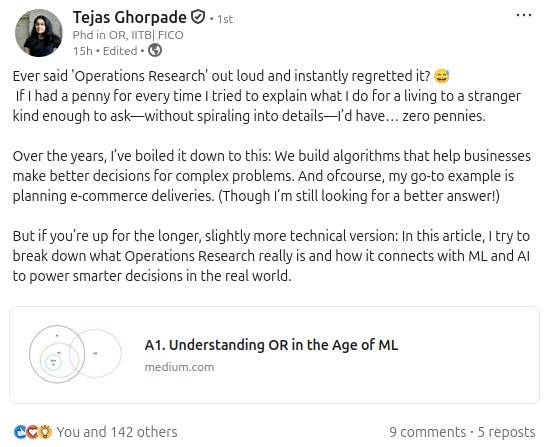📈 Comparing OR to ML, OR in the age of ML, should we rebrand the field?
Local Optimum: short, imperfect-yet-useful ideas - Edition #24
Welcome to a new edition of Local Optimum: a short, imperfect-yet-useful collection of ideas related to optimization, decision-making, and applied Operations Research.
Let’s dive in! 🪂
1) ↔️ Comparing OR to ML
Machine Learning is -without question- far more popular than OR.
Yet the two fields are closer than they seem.
That closeness often tempts us to compare them, usually out of a desire for OR to gain the same visibility and recognition it deserves. I’ve done it myself. And just recently, Laura Albert and co-authors captured this feeling perfectly in their paper “Making OR more accessible: insights from the rise of ML”.
Having a role model like ML isn’t a bad thing. In fact, it can be incredibly useful, as long as we approach it with intention.
Instead of envy, we can use it as a mirror: to identify what’s holding OR back and to tackle those issues one by one, with a concrete plan.
2) 🗣️ OR in the age of ML
Even saying the name of our field can be a problem.
Operations Research.
It rarely speaks for itself. You end up explaining what it means: decisions, optimization, algorithms, complexity… and by the time you finish, the person you’re talking to is already thinking of something else.
And this isn’t just my experience. I’ve seen it happen countless times to colleagues too:
(click in the image to go to the post)
3) ⁉️ Should we rebrand the field?
The naming debate in OR isn’t just semantics, it exposes deeper challenges at the intersection of branding, professional identity, and market communication.
The appearance of new labels shows how the field constantly reframes itself to sound more modern and aligned with tech trends. But frequent name changes can also create confusion, rebranding fatigue, and even signal instability to outsiders. So the real question is: should we change the name at all?
But that’s only the surface.
Beneath it lies a much bigger problem: the lack of recognition that keeps OR from being understood, adopted, and valued.
What we face isn’t just a naming issue, it’s a marketing one.
And that’s where the next challenge begins:
how do we communicate OR in a way the world actually understands?
Read about the marketing challenges here:
And that’s it for today!
If you’re finding this newsletter valuable, consider doing any of these:
1) 🔒 Subscribe to the full version: if you aren’t already, consider becoming a paid subscriber. You’ll get access to the full archive, a private chat group, and 30% off new products.
2) 🤝🏻 Collaborate with Feasible. I’m always looking for great products and services that I can recommend to subscribers. Also, if you want to write an article with me, I’m open to that! If you are interested in reaching an audience of Operations Research Engineers, you may want to do that here.
3) 📤 Share the newsletter with a friend, and earn rewards in compensation. You’re just one referral away from getting The Modern OR Engineer Playbook: Mindset, methods, and metrics to deliver Optimization that matters.
If you have any comments or feedback, just respond to this email!
Have a nice day ahead ☀️
Borja.






